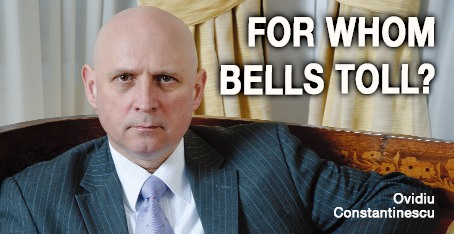'Future' and 'Planning' - some non-existent words in the Romanian language
There is no secret, Romanians' ability to plan forward is limited. Jokingly, it is said that it doesn't exceed three days because this is what the Turkish army needed to reach the capital. Planning means measuring three times and cutting once, so one may safely say that Ordinance No 114 (OUG 114, for short) is yet another example of an ill-conceived, ill-promoted and ill-implemented piece of legislation, incapable of seeing and planning wisely for the future.
To the government’s utter surprise (or not) the effects of the dreaded act have now begun to bear (poisonous) fruits: Romania has become a net electricity importer, more gas imports for the industry and household consumption; less money for maintenance and further growth, uncertainty over the development of the Black Sea gas deposits. All these – and others more - give the impression that Romania is living for the day and that there is no “tomorrow”.
Usually, bad news travels in pairs, and here we have no exception. The other bad news is that come the end of the year, the current contract between Gazprom and Ukraine over the transit of Russian gas will cease. And there are not many reasons for optimism that another one will be concluded without a hitch. Let’s face it, in 2018-2019 we had a joke of a winter and there is no certainty that the one to come will be just as mild.
The data show that Romania’s electricity and gas imports have both grew in the past six months. Romania has huge electricity production facilities: hydro, wind, solar, nuclear, coal and gas plants. Due to a surge in the Danube’s water flow, on May 23, Hidroelectrica produced an all-time-high 87 GWh, covering more than half of the country’s electricity needs. But hydro, nuclear and wind power are not enough, especially during troubled times. And troubled times are, ironically, due to the OUG114. During the first three months of 2019, Romania imported 1,125.5 million kWh. Exports counted for 62.6 million kWh. If one looks at the dynamics of the market, one could grasp the magnitude of the problem: exports were down by -52.9 percent, imports up by 78.5 percent. Hidroelectrica and Nucleaelectrica, the two state-owned companies that produce the cheapest electricity, have been heavily hit by OUG 114’s two-percent tax on turnover and the five percent cap on profit margins on energy supplied to household consumers.
Who cares that both need billions of euros for maintenance and further development to keep pumping energy in the long run?
Some are still day-dreaming about the elusive Chinese Prince Charming that will bring in the money for reactors 3 and 4 at Cernavoda and for the Tarnita-Lapusesti hydropower plant, asking for nothing in return. There is no surprise that gas imports have grown over the winter. The surprise is that the process has continued well into spring and now in mid-summer. Well, the surprise brings in good news and bad news. The good news is that the gas price on the international market is 2.31 $/MMBtu (US dollars per million BTU) which makes it sound to import. The bad news of the surprise is that despite the high imports, the levels in the gas deposits plummeted to 3.6 TWh, roughly 11 percent of the total national gas storage capacity. OUG 114 stimulated consumption for the regulated market while the same OUG 114 discouraged investments due to lack of funding and legislative unpredictability.
Alarm bells should start ringing. But not in the Ministry of Energy, where Mr. Anton Anton still believes that his idea of storing electricity in empty gas deposits is a good and feasible one. And the same goes for the Energy ombudsman – the Romanian Energy Regulatory Authority, the ANRE, where a person with no energy expertise whatsoever has been appointed as Vice President. The governing alliance was so confident in Marian Neacsu’s abilities and knowledge about the energy field that it didn’t even bother to let him be questioned by the members of the relevant parliamentary commissions, as required by the law. The last time they did, the candidates put stand-up comedians to shame, so no one was willing to take any risks this time.
So, there you have it: an ill-conceived piece of legislation that turned upside-down one of the most important and strategic industries; a party crony appointed in a key position without having the faintest idea about the matter, and an industry in stringent need of investments, hoping that things will not, literally, blow up. As if the word “future” is non-existent in the Romanian language.
The interview is also available in our print edition of Business Arena.
S-ar putea să îți placă:
COMENTARII:
Fii tu primul care comenteaza







